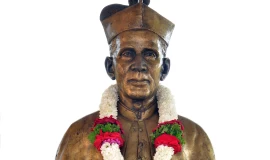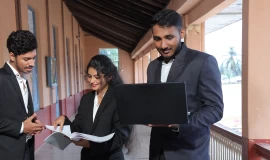PERSPECTIVE AND STRATEGIC PLAN FOR INSTITUTIONAL DEVELOPMENT
2021-22 to 2025-2026
St Philomena College was founded by Msgr Antony Patrao who felt that a college in this part of the state would save the people the inconvenience of moving to distant places for higher education. He set out to realize his dream and the mission was accomplished in the year 1958. Since its inception, the College has been growing steadily. The quantitative growth has been supplemented by undiluted quality.
Vision: To be a premier Institution for Higher Education, constantly in service to society in the field of education and welfare.
Mission: To educate and train young knowledge seekers for their holistic development to make effective contributions to society.
Core Values of the Institution:
· To provide opportunities for Higher Education to young knowledge seekers.
· To prepare the students to optimize the various social resources for sustainable growth and development.
· To sensitize the students about their social needs and problems.
· To provide guidance and support for the all-around development of the personality of the students.
· To help the students accomplish their career opportunities.
Motto: ‘Faith and Service’
Core Principles: hard work, purity, and knowledge
The Governing Council has prepared a Perspective Plan for the period of Five years commencing from the academic year 2021-22 to the academic year 2025-2026 by taking into consideration the quality indicators of NAAC. Inputs from all stakeholders, their expectations, management policies, and goals and objectives of the college are considered a base for formulating the perspective plan.
Objectives of Perspective Plan
While preparing the perspective plan, the IQAC has considered the following NAAC core values among the HEIs of the country:
§ Contributing to National Development
§ Fostering Global Competencies among Students
§ Inculcating a Value System among Students
§ Promoting the Use of Technology
§ Quest for Excellence
The major aspects considered in this perspective plan are-
· Curricular Aspects
· Augmentation of Infrastructure and Learning Resources
· Qualitative Strengthening of Existing Programmes
· Strengthening of Innovations in Teacher's Quality
· Research, Consultancy, and Extension
· Student Support and Progression
The draft of the Perspective Plan has been discussed, reviewed, and approved in the Governing Council meeting.
The focus of the Strategic Plan
1. Expand educational opportunities and avenues
§ Forecast industry requirements and societal educational aspirations and start new Undergraduate and Postgraduate programs/courses in the institute
§ Initiate multidisciplinary open electives
§ Initiate new specialized courses/programs based on students’ demand and faculty strength
§ Arrange skill development programs
§ Provide certificate programs in basic and advanced learning to help students fill in their skill and knowledge gaps.
§ Effective Implementation of the choice-based credit system
2. To create future leaders and innovators
§ Confidence-building measures to prepare students for facing new challenges
§ Providing various courses which will help in increasing learners’ practical knowledge
§ Conducting KPSC, UPSC, NET, KSET, Banking, etc courses free of cost
§ Periodic interaction with distinguished experts who have excelled in their field
§ Industrial visits to various business premises
§ Conducting basic computer/skill development courses through online platforms so that there is a seamless transformation from academic to professional life
§ Conducting skill-oriented training programs
§ Special training for postgraduate students on teaching and entrepreneurship
§ Enhancing the risk-taking abilities among students
§ Enhance support for student participation in State/National/International competitions
§ Supervised internships for students in the industry for a longer duration
§ Students’ involvement in institute governance
§ Organize the activities for the students by the students
§ Enhance the involvement of the student in organizing the activities like conferences, alumni meetings, etc.
§ Enhanced opportunities for students to participate in industrial and societal projects
3. To develop and execute an effective teaching-learning process
§ Increasing students’ engagement in learning
§ Encourage active, cooperative, experiential, and inductive learning
§ ICT-based teaching-learning
§ Organize Study tours/field visits and excursions for students
§ Provide state-of-the-art laboratory and library facilities
§ Encourage students to participate in seminars, conferences, workshops, and internships.
§ Evaluation of teachers by students and self-appraisal by staff
§ Periodic faculty development and skill enhancement programs
§ Uphold an appropriate student-teacher ratio.
4. To develop a comprehensive framework for student mentoring and ensure transparency in the assessment process
§ Provide mentor teacher for every group of students
§ Provide systematic remedial coaching to slow learners
§ Identification of advanced learners and help them to explore their potential
§ Continuous tracking of attendance of the students through the android app
§ Establishment of Equal Opportunity Cell and Women Development Cell
§ Publish the assessment process in the prospectus/student handbook
§ Establishment of Centralized Examination and Assessment System
§ Implementing a policy to institutionalize the CIE process
§ Provide modern, secure, and comfortable accommodation for girl students, increase accommodation for girl students.
§ Initiative to support secured transport facilities for girl students, and women employees to the institute
§ Support through mentoring groups
5. To bring alumni engagement on board
§ Register alumni association in accordance with the Societies Registration Act.
§ Enable, and facilitate seamless coordination between alumni association and Institute
§ Initiative for supporting alumni’s need for continued learning and career improvement
§ Multiple interaction modes – interaction between alumni and students – mentoring, the interaction between alumni and faculty
§ Alumni inputs for curriculum development
§ Alumni support for students placement and internship
§ Enhance institute responsiveness to alumni request
§ Creation of an Alumni Center at the institute to support alumni visits, activities engagement
§ Create and establish alumni chapters in different parts of India and abroad
§ Build corpus fund for sustainable activities of the alumni association
6. Advance Frontiers of knowledge
§ Encouraging the teachers to participate in Orientation Programme, Refresher Courses, Short Term Courses, etc.
§ Encourage teachers to participate in Workshops, Seminars, and Conferences
§ Provide Internet facility and Laptops to faculty members
§ Upgrade Library resources every year by making provisions in Departmental Budget
§ Encourage teachers to present research papers in seminars and research conferences.
§ Encourage faculties to undertake a minor and major research projects by offering seed money and in-house facilities.
§ Develop university-recognized research centers in college.
§ Organize advanced research conferences at the institute
§ Enable staff to register for Ph.D. with parent University and other universities
§ Encourage the formation of multidisciplinary research teams and centers
§ Enhance research facilities and research grants
§ Proactive and flexible mechanism to attract quality faculty and researchers
§ Add-on courses in contemporary subjects for all students
§ Establish linkages with reputed enterprises and educational institutions
§ Depute staff to career advancement programs
7. Explore new avenues of fundraising
§ Enhanced engagement with stakeholders
§ Fundraising through fees hike for self-financing, in-demand, and professional courses
§ Obtain research grants from funding agencies such as UGC, DBT, etc
§ Initiate research projects from industry, government research organizations, and centres of excellence
§ Initiate consultancy projects scheme
§ Attract benefits from Corporate Social responsibility (CSR)
§ Funding for construction/ development work from the Government
§ Funding for institutional development schemes from philanthropists
8. Enhance on-campus life and experience
§ Upgrade and face lifting existing infrastructure and their surroundings to make the campus neat, clean, and green
§ Priority for expansion of accommodation facilities for students, staff, and faculty
§ Enhance and revamp faculty advising system
§ Annual student satisfaction survey
§ Enhance students learning facilities with ultramodern, spacious, well-ventilated classrooms, laboratories, sports, and recreation centres
§ Involve students, staff, and faculty in campus planning including green and clean campus initiatives
9 Create quick response internal support systems
§ Simplify systems and processes
§ Delegate authorities and responsibilities to Principal, Vice-Principal, Faculty Members and Administrative Staff
§ Conduct periodic and need-based meetings
§ Promote team spirit and healthy relations amongst staff members of the institution
§ Free up faculty/students' time for education and research by time saver techniques for non- academic processes
§ Service response, online complaint systems
§ Parallel track – incentives and career growth, retraining existing staff
§ Service orientation – to enable education and research
§ Appropriate delegation at all levels of decision-making and leadership
§ Enhance sports facilities with state of art cricket court, track, fields for football and hockey, etc
§ Incubation Center with 1000 Sq. Ft. area for students startups
§ Initiation to enhance Project-based learning
§ Starting social internships
§ Engage the students fruitfully during vacations in activities for employability enhancement such as Project internships, Skill based courses, Training for soft and communication skills, improved Aptitude, Computer Programming, and special tools specific to the disciplines
10. Promotion of mutually beneficial engagement with industry and society
§ Proactive approach for industry interactions - Adjunct faculty from industry and academia
§ Encouragement to faculty for core industrial exposure
§ Focus approach on technology patenting and commercialization
§ Establishment of Innovation and Entrepreneurship Cell (IEC)
§ Ecosystem for startup and entrepreneurship through IEC
§ Addressing the need-based societal and research problems through content beyond the curriculum
§ Easy interface for the local community and school for the interaction and knowledge dissemination
11. Institution Development Plan
§ To transform the Institution into an Autonomous Institution.
§ Implementing NEP 2020 in line with its spirit and preparing the Institution to offer Honors
Degrees.
§ Establishing an Innovation and Incubation Centre.
§ Upgrading Research Facilities and enhancing research outcomes.
§ Ensuring that all teachers attain the required qualifications in accordance with UGC norms.
§ Establishing additional partnerships with businesses and academia for research and placements.
§ Dedicated / Customized LMS for the Institution.
§ Introducing new professionals and on-demand programs such as MCA, MBA, B. Com (Vocational), BCA(Vocational), M Sc Organic Chemistry, BA(HRD), B. Com - Office Management & Secretarial Practice (Voc), B.B.A Logistics, MA English, …
§ Strengthening the Placement and Training Cell with a specialized human resources unit that trains students for employment in government and corporate sectors.
§ To become one of the high-performing institutions in NIRF by placing within the 1–50 rank bands.
§ ISO 9001:2015 Certification.
§ Establishing Collaboration with foreign universities for staff and student exchange
§ Building a separate library block
§ Establishing a Campus-wide Wi-Fi Networking
§ Open a Cafeteria
12. Deployment of the Strategic Plan
The Institution strongly advocates democratic principles. As a result, the institution used participative and decentralized management in its administration. The Institute's strategy paid off when most of its perspective plan agendas were carried out on time and in a methodical manner. The institutional strategies used to carry out the plan include
Approval from the Management: Top Management or Local Management makes all significant decisions. The Executive Council will discuss this proposal at its regularly scheduled meeting, approve its implementation, and provide the Principal instructions on how to proceed. Collaboration with an external agency: The Principal will discuss the potential for external cooperation and collaboration with the concerned user party. Execution will occur if feasible. Budgetary provision: A budgetary provision was thought over and the same will be submitted to the Management for approval. Action Plan: The Principal will develop an action plan for the implementation of the initiative under the direction of Management.






